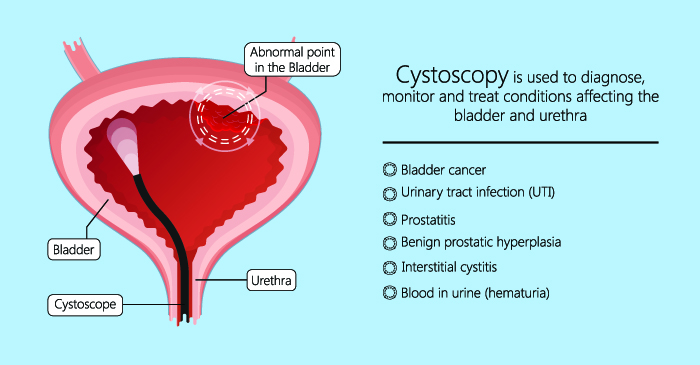Cystoscopy Surgery in Chunni-ganj, Kanpur
Doctors commonly use cystoscopy treatments to view the inside of the urethra using a pencil-sized tube with a camera attached to it. Usually, a urologist performs cystoscopy treatment.
What is the meaning of Cystoscopy Treatment?
A urologist or a specialist uses a device called a cystoscope to view the insides of your bladder and urethra to diagnose diseases, infections or even treat any problems in the urinary tract.

What is cystoscopy used to treat?
Doctors use cystoscopy to treat and diagnose several urinary tract problems like:
- Bladder stones
- Bladder cancer
- Problem in controlling the bladder
- Enlarged Prostate
- Urinary Tract Infections (UTI)
- Urethral fistulas and strictures
Which candidates should go for Cystoscopy treatment?
Your doctor or urologist may ask you to undergo a cystoscopy treatment if:
- You face issues with bladder control like urinary incontinence or urinary retention.
- If the doctor wants to detect the presence of bladder stones
- If you experience hematuria (blood in your urine)
- If you experience dysuria (pain during urination)
- If you face recurring Urinary Tract Infections (UTIs)
How to prepare for a Cystoscopy treatment at Apollo Spectra, Kanpur?
- Your doctor will prescribe you some antibiotics that you will require to take before and after undergoing cystoscopy.
- Ensure you drink a lot of water and do not empty your bladder beforehand. Your doctor will ask you to undergo a urine test right before you proceed for cystoscopy.
How is the procedure of cystoscopy treatment performed at Apollo Spectra, Kanpur?
- The medical practitioner at Apollo Spectra, Kanpur will ask you to empty your bladder before cystoscopy. Afterwards, your doctor will ask you to lie down with your knees bent and your feet in stirrups.
- Your doctor will decide whether you will be given a sedative or general anaesthesia before undergoing a cystoscopy. A simple cystoscopy will take 15 minutes, but sedative cystoscopy can last for 30 minutes.
- Your doctor will apply a jelly in your urethra that will numb any pain that the cystoscope can cause. After this initial process, the doctor will push the cystoscope through the urethra.
- The doctor will fill your bladder with a sterile solution. This solution will help to get a better view of the inside. After this procedure, the doctor will ask you to go and urinate.
- Your doctor will take samples of the tissues for conducting tests in the labs.
What are the treatments associated with cystoscopy?
- To remove the polyps, tumours, abnormal tissues, and bladder stones.
- To treat the urethral strictures and fistulas, doctors use cystoscopy treatment.
- Injecting medication to stop the leaking of urine (like in urinary incontinence).
- Removing any urinary stent that a surgeon had placed during previous treatment.
- Getting the samples of ureters.
- Taking out a small piece of bladder tissues for biopsy.
When to see a doctor for cystoscopy treatment at Apollo Spectra, Kanpur?
If you face any symptoms that need treatment with cystoscopy, you should book an appointment with your doctor.
If you've already undergone cystoscopy and experience the following for more than two days, contact your doctor immediately.
- Extreme pain in the abdomen and while urinating
- A lot of blood and blood clots coming out during urination
- Fever
- Smelly or cloudy urine
- Losing the ability to urinate
Request an appointment at Apollo Spectra Hospitals, Kanpur
Call 1860-500-2244 to book an appointment
What are the side effects of the Cystoscopy Treatment?
- You might see blood coming out from your urethra. You will notice this when you urinate, and the colour turns pink.
- You can experience a burning or painful sensation during urination.
- You will feel like urinating more for the next three or four days.
What are the complications associated with cystoscopy treatment?
- In rare cases, the cystoscope might cause infection in your urinary tract.
- Moderate to severe bleeding might occur, which you can see coming out with your urine
- There might be a lot of pain you experience for the next few days. You will experience pain in the abdomen and a burning and painful sensation while urinating
The complications are serious if:
- You cannot urinate at all after cystoscopy
- Nausea and severe abdomen pain
- The pain while urination last for more than three days
CONCLUSION
Doctors use cystoscopy to treat urinary tract problems. Cystoscopy treatment also helps to diagnose issues. You should know that a cystoscopy treatment can be uncomfortable but should not be painful. Hence, if you feel pain and extreme discomfort, discuss it with your doctor.
Yes, cystoscopy can be embarrassing for the patient. Yet, doctors handle the genitalia with respect. A patient is kept exposed only during the treatment and not beyond the evaluation time.
The test results for cystoscopy take up to one or two weeks to come. Usually, you will have to book a follow-up appointment after getting the results.
Doctors advise shaving a few days before cystoscopy. Do not try shaving right before the cystoscopy procedure, as this might allow the bacteria to remain near the genitalia.
Symptoms
Our Top Specialities
NOTICE BOARD
CONTACT US
CONTACT US
 Book Appointment
Book Appointment


.svg)
.svg)
.svg)
.svg)








